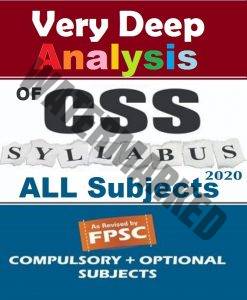Democracy & Illiteracy Do Not Move Together [CSS 2019]
Essay on the topic “Democracy & Illiteracy Do Not Move Together [CSS 2019]”
Democracy & Illiteracy Do Not Move Together
1. Introduction
- Democracy: definition and concept
- Illiteracy: definition and concept
2. Why democracy and illiteracy do not move together?
- Illiterate electorate elects undeserving candidates
- Illiteracy decreases voter turnout
- Illiterate politicians don’t let democracy deliver
- Illiterate rulers focus on short-sighted policies
- Illiteracy discourages the decentralisation of power and authority
- Illiteracy is an impediment to accountability
- Illiteracy keeps women (the half population) backwards and marginalized
- Illiteracy produces leadership of poor quality
- Illiteracy negatively impacts the transparency of the electoral process
- Illiteracy slows down the process of political evolution
3. Factors responsible for the prevalence of illiteracy
- Flawed policies
- Poor implementation of plans
- Budgetary constraints
- Overpopulation
- Social and cultural barriers
- Poverty and backwardness
- Bad governance and corruption
4. Recommendations for the elimination of illiteracy
- Devising of sharply focused policies
- Across-the-board implementation of plans
- Role of developed states in the provision of economic support
- Pragmatic policies for population control
- Awareness campaigns to eliminate social and cultural barriers
- Poverty-alleviation programmes
- Eradication of bad governance and corruption
5. Some other recommendations for the strengthening of democracy
- Effective role of media
- Hectic campaigns by the opinion-makers
- Fruitful role of UNO
- Protecting the rights and freedoms of individuals
- Strengthening democratic institutions
- Ensuring the rule of law
6. Conclusion
Democracy is a form of government in which the power is held by the people, either directly or through their elected representatives. In a democracy, the people have the right to participate in the decision-making processes of the government and to hold their leaders accountable for their actions. Illiteracy, on the other hand, refers to the inability to read and write. It is a problem that affects a significant portion of the world’s population and can have serious consequences for individuals and societies. It is generally understood that democracy and illiteracy do not go hand in hand, as an educated and informed citizenry is necessary for a functioning democracy. In order for people to be able to participate in the decision-making processes of their government and hold their leaders accountable, they need to be able to understand and evaluate the issues at hand. Illiteracy can prevent people from being able to do this, as they may not have the necessary skills to comprehend and analyze complex political issues.
Why democracy and illiteracy do not move together?
Illiterate electorate elects undeserving candidates: If a significant portion of the population is illiterate, they may not have access to information about the qualifications and positions of different candidates running for office. This can lead to the election of candidates who are not qualified or who do not represent the interests of the population.
Illiteracy decreases voter turnout: Illiteracy may also lead to a lower voter turnout, as individuals who cannot read or write may be less likely to participate in the electoral process. This can result in a smaller portion of the population having a say in who is elected to public office.
Illiterate politicians don’t let democracy deliver: If politicians are illiterate, they may not have the knowledge and skills necessary to effectively govern and implement policies that benefit their constituents. This can lead to a lack of progress and development in the community, and a failure of democracy to deliver on its promises.
Illiterate rulers focus on short-sighted policies: Illiterate rulers may also be more likely to focus on short-sighted policies that do not address long-term issues facing the community. They may be unable to understand and analyze complex issues, leading to a lack of comprehensive and effective policies.
Illiteracy discourages decentralisation of power and authority: In a democracy, it is important for power and authority to be decentralized and shared among different levels of government and among different groups within the community. However, if a significant portion of the population is illiterate, they may not have the knowledge and skills necessary to participate in the decision-making process and may be excluded from positions of power and authority. This can lead to a concentration of power and a lack of decentralization.
Illiteracy is an impediment to accountability: Illiteracy can also make it difficult for individuals to hold their government and elected officials accountable for their actions. If individuals cannot read or write, they may be unable to access information about the actions of their government and may be unable to effectively communicate their concerns and hold their representatives accountable.
Illiteracy keeps women (the half population) backward and marginalized: Illiteracy disproportionately affects women, as they are often denied access to education and face other barriers to learning. This can lead to a lack of representation and participation by women in the democratic process, and can result in policies and decisions that do not adequately address the needs and concerns of women.
Illiteracy produces leadership of poor quality: Illiteracy can also lead to a lack of qualified leaders, as individuals who are unable to read or write may not have the knowledge and skills necessary to effectively govern and make informed decisions. This can result in poor quality leadership and a lack of progress and development in the community.
Illiteracy negatively impacts the transparency of electoral process: Illiteracy can also make it more difficult for individuals to understand and participate in the electoral process, leading to a lack of transparency and accountability. This can undermine the integrity of the democratic process and discourage citizen participation.
Illiteracy slows down the process of political evolution: Finally, illiteracy can hinder the process of political evolution and progress, as it limits the ability of individuals to access information and engage in critical thinking about issues facing their community. This can lead to a lack of progress and development in the political system, and a failure to address the changing needs and concerns of the population.
READ: » Expanding Information Technology: Can be a Curse and a Blessing [CSS 2019]
Factors responsible for the prevalence of illiteracy
Flawed policies: One factor that can contribute to the prevalence of illiteracy is the existence of flawed education policies. If policies are not designed in a way that effectively promotes access to education and addresses the needs of disadvantaged groups, it can lead to a lack of progress in increasing literacy rates.
Poor implementation of plans: In addition to flawed policies, poor implementation of education plans and programs can also contribute to the prevalence of illiteracy. If resources are not allocated effectively or if there are gaps in the delivery of education services, it can prevent individuals from gaining the knowledge and skills they need to become literate.
Budgetary constraints: Budgetary constraints can also limit the ability of governments to invest in education and increase literacy rates. If there are insufficient resources available to fund education programs and initiatives, it can make it more difficult to provide access to quality education for all members of the community.
Overpopulation: In some cases, high population density can also contribute to the prevalence of illiteracy. If there are too many students for the available educational resources, it can lead to overcrowding in classrooms and a lack of individualized attention for students, which can hinder their learning and progress.
Social and cultural barriers: Social and cultural barriers can also contribute to illiteracy. For example, in some societies, there may be a stigma attached to education, particularly for girls and women. This can discourage individuals from seeking education and can limit access to educational resources.
Poverty and backwardness: Poverty and backwardness can also be major factors in the prevalence of illiteracy. If individuals are unable to afford the cost of education or do not have access to educational resources, it can prevent them from gaining the knowledge and skills they need to become literate.
Bad governance and corruption: Finally, bad governance and corruption can also contribute to the prevalence of illiteracy. If public officials are not committed to investing in education and promoting access to educational resources, it can hinder progress in increasing literacy rates. Corruption can also divert funds that could be used for education to other purposes, further limiting the availability of resources for education.
Recommendations for the elimination of illiteracy
Devising of sharply focused policies: One recommendation for the elimination of illiteracy is to devise sharply focused policies that address the specific needs and challenges facing the education system. This may include policies that promote access to education for disadvantaged groups, provide resources for teacher training and development, and invest in infrastructure and technology to support learning.
Across-the-board implementation of plans: In order to effectively eliminate illiteracy, it is important to ensure that education plans and programs are implemented consistently and effectively across the board. This may involve providing adequate funding and resources for education, training teachers and educators, and ensuring that all students have access to quality education.
Role of developed states in the provision of economic support: Developed states can play a significant role in the elimination of illiteracy by providing economic support to developing countries. This may include funding for education programs and initiatives, as well as technical assistance and expertise to help strengthen education systems and improve literacy rates.
Pragmatic policies for population control: In order to address the challenges of overpopulation and limited resources, it may be necessary to implement pragmatic population control policies. This could involve efforts to promote family planning and reproductive health, as well as policies that encourage economic growth and development, which can help to reduce poverty and improve access to education.
Awareness campaigns to eliminate social and cultural barriers: Awareness campaigns can also be effective in eliminating social and cultural barriers to education. This may involve efforts to change societal attitudes towards education and to promote the importance of education for both boys and girls.
Poverty-alleviation programs: Poverty can be a major barrier to education, particularly in developing countries. To address this issue, it may be necessary to implement poverty-alleviation programs that provide assistance to individuals and families living in poverty, such as cash transfer programs and employment initiatives.
Eradication of bad governance and corruption: Finally, efforts to eliminate illiteracy must also include efforts to eradicate bad governance and corruption. This may involve strengthening accountability and transparency in the education system, as well as efforts to combat corruption at all levels of government.
Some other recommendations for the strengthening of democracy
Hectic campaigns by the opinion-makers: Opinion-makers, such as community leaders, academics, and civil society organizations, can also play a role in strengthening democracy through their activism and advocacy efforts. They can use their platforms to raise awareness about important issues, promote democratic values and practices, and engage citizens in the democratic process.
Fruitful role of UNO: The United Nations (UN) can also contribute to the strengthening of democracy through its various programs and initiatives. For example, the UN may provide technical assistance and support to countries seeking to strengthen their democratic institutions, or it may advocate for the promotion of democratic values and practices globally.
Other recommendations for the strengthening of democracy may include:
Protecting the rights and freedoms of individuals: It is important for democratic societies to protect the rights and freedoms of individuals, including the right to freedom of expression, assembly, and association.
Promoting the participation of all members of society: In order for democracy to be effective, it is essential that all members of society are able to participate and have a say in the decisions that affect their lives. This may involve efforts to increase voter turnout, as well as efforts to ensure that marginalized groups are represented in the democratic process.
Strengthening democratic institutions: Strong democratic institutions, such as a free and fair electoral system, an independent judiciary, and accountable and transparent government, are essential for the functioning of a healthy democracy. Efforts to strengthen these institutions can help to promote stability and trust in the democratic process.
Ensuring the rule of law: It is also important for democratic societies to uphold the rule of law and to ensure that laws and policies are applied fairly and consistently. This can help to promote accountability and trust in the democratic process.
Conclusion
In a nutshell, democracy and illiteracy do not move together. In order for democracy to function effectively, it is essential that citizens are educated and informed, and able to participate in the democratic process. Illiteracy can limit access to information, decrease political participation, and hinder critical thinking skills, all of which can undermine the integrity of the democratic process. In order to promote democracy and eliminate illiteracy, it is necessary to implement policies and programs that promote access to education, address social and cultural barriers, and combat bad governance and corruption. By working together to eliminate illiteracy and strengthen democracy, we can create a more equitable and just society for all.
This is not the final draft of the essay on the topic “Expanding Information Technology: Can be a Curse Or a Blessing”. It may need further improvement. So, please let us know about your feedback on SeekerGK.com [[email protected]] or write in the box below that on which topic you want us to write an essay:)
For MCQs of all competitive exams, visit CSS MCQs
To Download
Expanding Information Technology: Can be a Curse Or a Blessing
in PDF Click below



